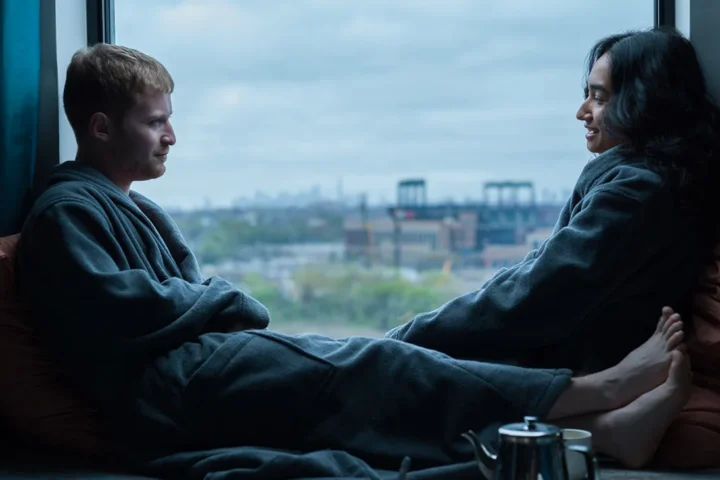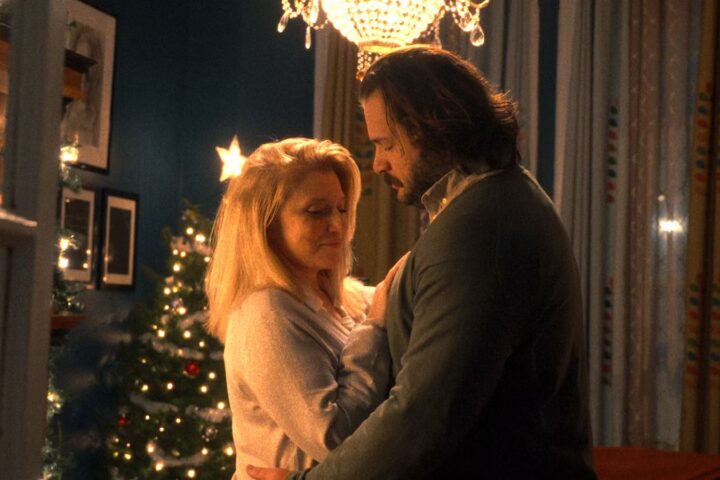After the glowing reception for her Oscar-nominated 2023 debut Past Lives, Celine Song could have easily followed up with a crowd-pleasing hit that “checks all the boxes”—a phrase her new film, Materialists, uses not-so-ironically to describe the modern partner checklist. Funny? Check. Smart? Check. Big spender? Check. Attractive? Obviously—check. And if you go by distributor A24’s marketing, Song’s latest is just that: a glossy commercial rom-com.
But calling Materialists that would sell it far short. It’s as finely observed a film about modern love and relationships as we’ve seen in some time. And while the romantic comedy may be an American genre on life support, Song isn’t here to revive it—even though she borrows the familiar setup of a woman torn between two very different suitors. What sets this one apart is how Materialists dodges sitcom-style fluff to tackle deeper questions about love, money and worth.
Before becoming a breakout writer-director, Song worked as a Manhattan matchmaker—and like her on-screen proxy Lucy (Dakota Johnson), a Greenwich Village dating consultant, she’s assembled savagely funny observations about what people think they deserve. Lucy works at Adore, a boutique agency serving New York’s dating elite. With nine client marriages (“Marriage is a business deal”) to her credit, she’s become something of an urban legend—and desperate single women (and men) clamor to get a slot on her calendar, and listen to her sage counsel (“I promise you that you will marry the love of your life”); in an early moment she uses clever psychology to nudge a cold-footed bride to the altar.
Ironically, Lucy is still single herself—that is, until a wedding invitation leads to a meet-cute with a “unicorn” (checks every box!) billionaire named Harry, played with gentle ease by a never-better Pedro Pascal. Harry is immediately taken; he sees Lucy as his potential future, explaining “I have enough material assets for the both of us.” She, however, drawing on her professional understanding of compatibility, senses a big time mismatch. She’s 35, earns (a mere) $80k a year and knows how to stay in her lane. But prime catch Harry is undeterred.
Song stages an early courtship dinner scene between the pair in what may be the sharpest written dialogue in an American film this year, Lucy assessing her modest market value and Harry correcting her lowball. “I don’t like you because you’re rich,” Lucy confesses. “Then why do you like me?” “Because you make me feel…valuable.” This is insightful, smart stuff.
Soon they’re shacking up in his multimillion-dollar penthouse and planning a trip to Iceland, possibly with a proposal in the carryon. Why not? Well—for one—Lucy doesn’t love him. Harry thinks that’ll change. The bigger issue? Lucy’s lingering attachment to her ex, John, a broke 37-year-old actor with at ton of sincerity but no savings, winningly played by Chris Evans—reminding us he doesn’t need a cape to be a movie star.

Think you know where this is going? That’s only part of the story. Song uses the romantic triangle not for melodrama or hijinks, but to ask pointed questions: Can love grow with money? Can it survive without it? And is it safer—smarter—to choose security over passion? If not, what happens when romance fades, as does your partner’s paycheck?
Later, the incisive screenplay considers the bruising pitfalls of modern dating when Lucy’s favorite client, Sophie (Zoe Winters) is assaulted on a date Lucy arranged. Song doesn’t pull punches: curated veneers conceal danger. As the shattered woman lashes out at her, calling her a “pimp,” the guilt of having engineered the incident sends Lucy spiraling.
The low-key, appealing Johnson continues her evolution as a leading lady following last year’s two-hander Daddio opposite Sean Penn. She rarely overplays, bringing instead a modest introspection, eyes aflicker about what Lucy may (or may not) reveal. At one juncture, Johnson matter-of-factly delivers a blunt assessment of a newlywed couple’s odds. And during a Midtown lovers’ spat over exorbitant parking fees, she believably comes to a tough realization. Later, after a middle-of-the-night revelation, she shows real grace. It’s a special performance.
Pascal does strong work here and to his credit, Harry, a character ripe for caricature given his billionaire boys’ club status, is neither a fop nor foil; he’s a real person with his own surprising insecurities. And Evans has a few tender confessions—including one set on a downtown stoop reminiscent of Past Lives’ poignant finale—that damned near steal the movie.
It’s been quite some time since we had a “New York movie” as polished as Materialists, which envisions a city of gleaming style with a hardscrabble core. Like in Past Lives (both films were shot by DP Shabier Kirchner), Song sees these in tandem; she presents a glossy surface of bohemian downtown byways, slickly monied elegant affairs and upscale eateries. At the same time, she peels back these surfaces to present an alternative vision—rough and tumble burrows, hand-to-mouth walk-ups and grinding daily hustles. And special mention goes to the inspired use of Harry Nilsson’s vintage “I Guess the Lord Must Be in New York City,” the 1969 track originally written for Midnight Cowboy but ultimately scrapped for Nilsson’s “Everybody’s Talkin’.” How Song weaves the number into her film and the contrast she draws effectively lands.
As was Past Lives, Materialists is a meditation on love, with a woman caught between two very different partners who each see, and know, distinct sides of her as each offers a viable future (and many might argue that no modern single person would think twice about marrying into a financial windfall with a charismatic partner, and work on compatibility later). Each path is written and presented with sincerity and intelligence, and the film could plausibly have landed on either. Song chooses instead to wrap on a striking, static master shot that plays over the closing credits—several quiet minutes of cautious optimism in the face of an unknowable future. How can we ever be sure we’re making the right choice when we make it?
Materialists is that elusive, grown-up American film as smart as it is perceptive.
3 1/2 stars



